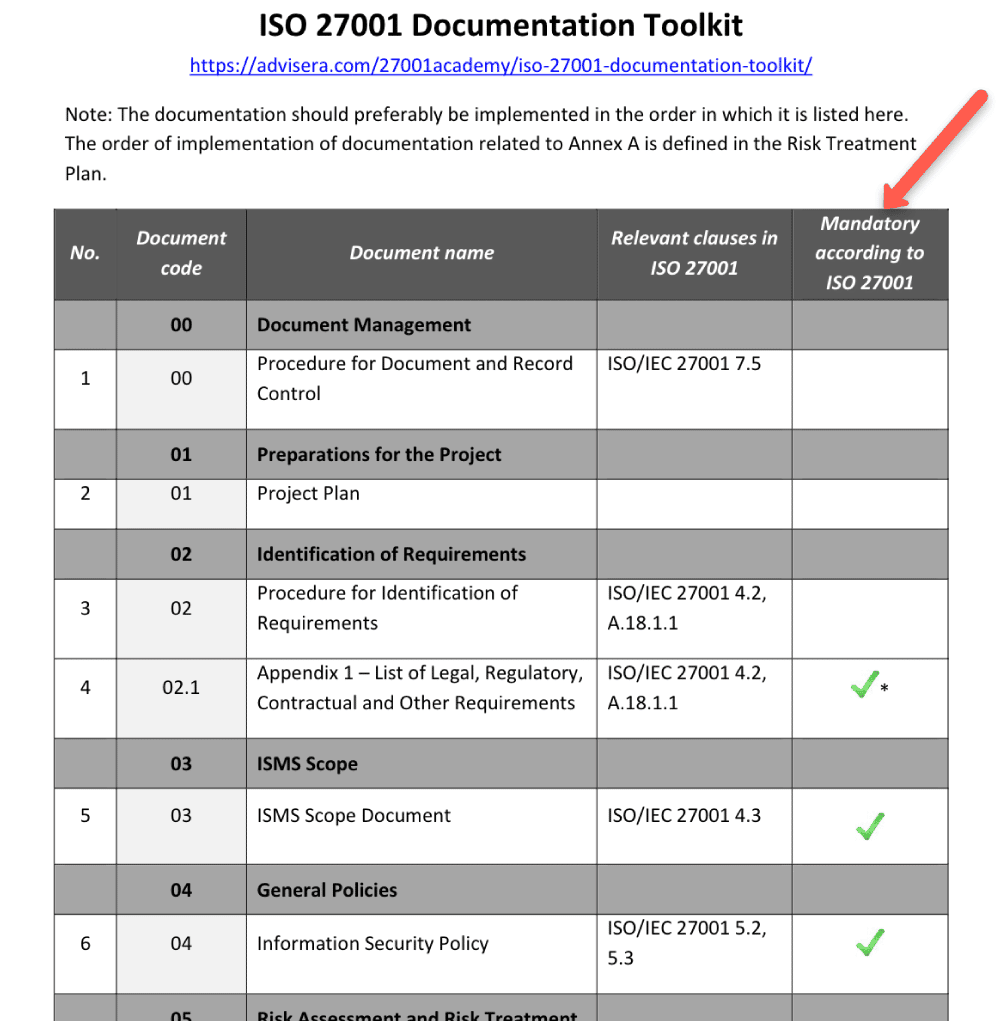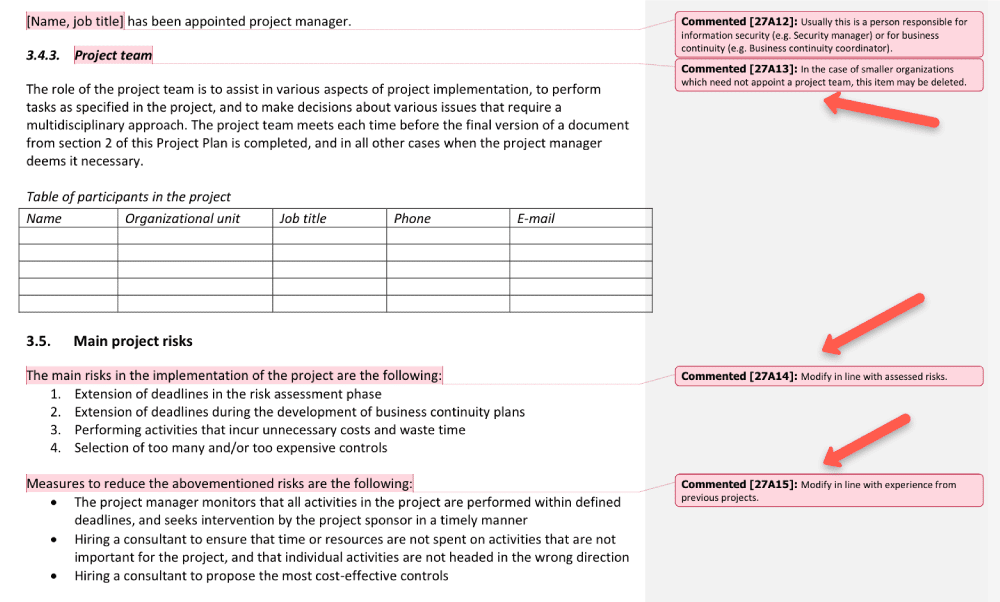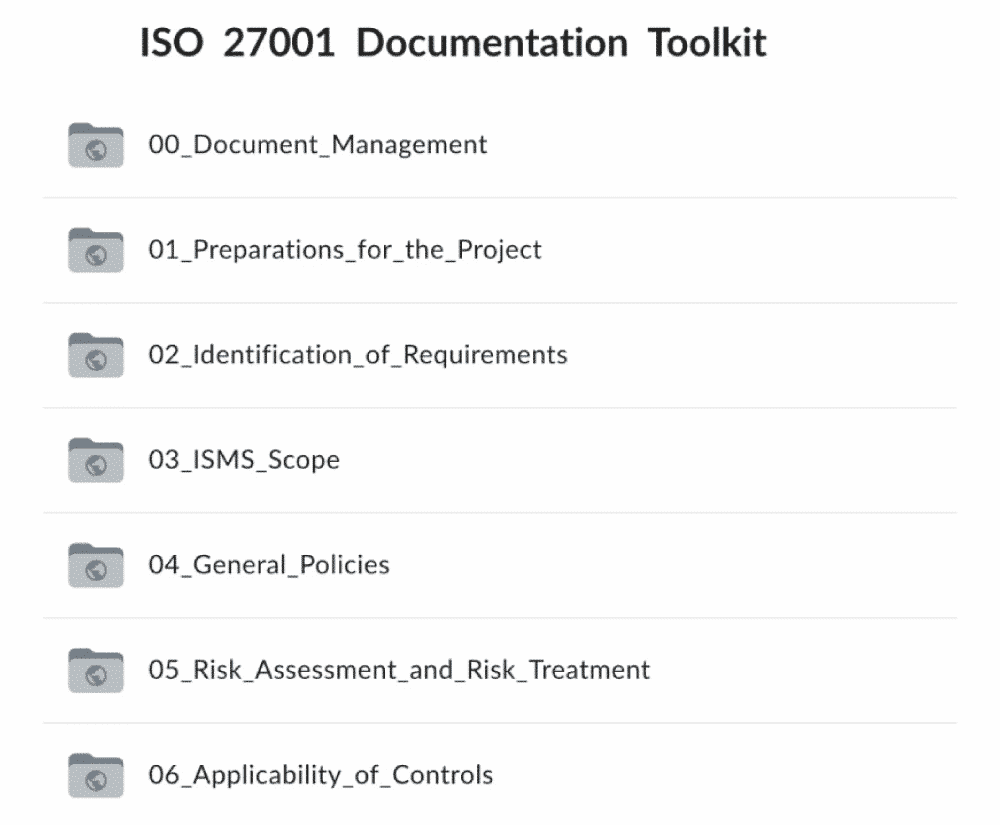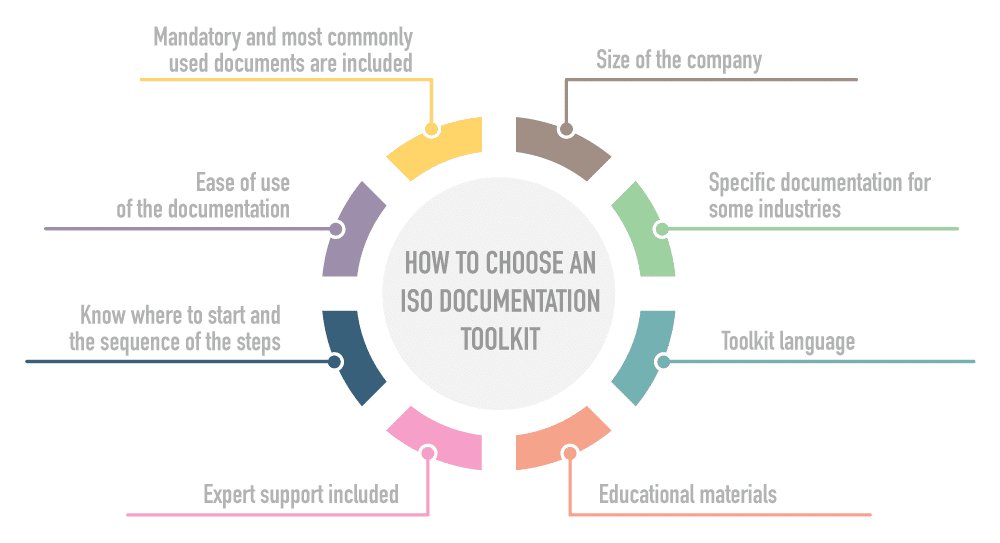When a company decides to go for any ISO certification, one of the options to consider for the successful implementation of the standard is the use of a documentation toolkit. This is probably not the cheapest option, because you will need to invest the time of your employees, but it’s not the most expensive, either, compared with hiring a consultant. So, how do you decide which toolkit to purchase to meet your needs? How can a toolkit help you with the certification? Read further to find out.
- Mandatory and most commonly used documents are included
- Ease of use of the documentation
- Know where to start and the sequence of the steps in the implementation
- Expert support included in the toolkit
- Educational materials
- Toolkit language
- Specific documentation for some industries
- Size of the company
What to consider when acquiring a toolkit
When purchasing a toolkit, there are a couple of criteria you should take into account in order to find the best fit for your company. Here’s what you should be looking for:
1. Mandatory and most commonly used documents are included
You need to make sure that the documentation of the toolkit includes not just all the mandatory documents, but also those that are not mandatory, but are most commonly used to ease the implementation process. The mandatory documents are those that you need to produce in order to be compliant with the requirements of the standard. Some examples can include the top-level policy, the scope, the objectives, corrective actions, internal audit reports, etc.
There are additional documents that, even though they are not mandatory, can prove to be very useful for your management system – for instance, a procedure for internal audit is not required by most of the ISO management standards; however, this procedure will make it much easier to organize the internal audit process.
Advisera’s toolkit includes both mandatory and non-mandatory documents. In the root folder of a toolkit you’ll find the List of Documents, which will specify for each document whether it is mandatory or not – this way, it will be easier for you to decide what you have to write and what is optional.

Usually, smaller companies tend to write fewer documents, so if this is your case, you will need to make sure that your company complies with the standard without writing unnecessary documentation.
2. Ease of use of the documentation
A good toolkit should contain documents that are easy to complete and that explain the technicalities of the ISO standard that are often confusing for companies.
In the case of Advisera’s toolkit, documents are at least 80% completed, and they are fully customizable. You just need to complete the document by entering specific information – the placeholders where this information needs to be filled out are clearly marked. In addition, the toolkit documents include an average of 20 comments with guidelines, whose purpose is to help the user in filling out the templates and understanding the requirements to be fulfilled by the organization.

3. Know where to start and the sequence of the steps in the implementation
A toolkit needs to show clear steps in the implementation, so that you know exactly where to start and where to go next after completing every document.
A well-structured toolkit allows you to achieve a smooth and productive implementation. For example, if you develop a procedure for the control of documents and records at the very beginning of the implementation, before anything else, it will help the company to set the basics of the management system and make other steps easier.
Advisera’s toolkit is organized in clearly numbered folders that contain different documents, so you know what the steps of the implementation are.

4. Expert support included in the toolkit
ISO certification is more than just a pile of documents; you need to adapt the implementation to your own company in order to fulfill the requirements of the standard, including dealing with your employees and management. This is where support from experts can be very beneficial for your company.
Experts will help you to answer difficult questions, or simply guide you throughout the different steps of the implementation so you can make sure your management system is ready for certification, avoiding any surprises at the end of the project.
Along with Advisera’s toolkit, there are different types of support provided:
- via email – having the opportunity to send an unlimited number of emails
- via on-on-one meetings – placed by telephone, Skype, or any other method that suits your company needs
- review of your documents – once you complete the templates included in the toolkit, you will be able to send them to an expert for their review. The expert will then explain how to improve the documents so that they are fully compliant with the standard.
5. Educational materials
If it is your first time implementing a management system using a tool like this, some additional expert materials can help you understand the different requirements of the standard and complete the documents.
Every document included in Advisera’s toolkit contains links to a variety of expert materials in the form of articles, white papers, and even free online courses where you will acquire the necessary knowledge to understand the requirements of the standard. Even more, the toolkit includes video tutorials that will guide you with detailed instructions on how to fill out the different documents.
6. Toolkit language
Some companies struggle to find an appropriate toolkit that uses the language of their country or for the brand that the company has on the other side of the globe. With Advisera’s toolkit this will not be a problem, because you can find the documents in many different languages besides English, including German, Spanish, French, Italian, Portuguese, Japanese, Chinese, and others. This way, your company will no longer spend time or money translating documents.
7. Specific documentation for some industries
If you are looking for documents specific to your type of industry, Advisera´s toolkit offers you a variety of documents made for different industries such as food processing, construction, transportation, IT companies, etc.
However, it is important to mention that Advisera’s toolkit can be used for any type of organization, and it is primarily optimized for small and medium-sized companies.
8. Size of the company
The number of employees influences the number of documents, but also their complexity. While large companies require the development of numerous documents, small and medium businesses can comply with the documentation requirements of the standard with fewer documents.
Advisera toolkit provides you with just those documents that are necessary to fulfill the requirements of the ISO standard for a small or medium company, avoiding useless templates that do not benefit the management system of the organization. Moreover, the user can check the List of Documents included in the toolkit to see which documents are mandatory and which are not, and decide which templates adapt better to the processes of the company.
Make the implementation simple by using Advisera’s toolkit
By using Advisera’s toolkit, you will reduce costs by up to 80% when compared to hiring a consultant, and significantly reduce the time invested in the implementation project compared with using your own resources and employees. Advisera’s toolkit not only contains the mandatory documents to comply with the standard, but also provides your employees with the necessary knowledge to implement the standard and maintain the management system in your organization.
In addition, you will make sure that your company has a successful certification, as different types of support are available during the implementation process – including experts who will guide you throughout the different steps of the implementation.
To get a free demo of a documentation toolkit, download one here:

 Iciar Gallo
Iciar Gallo